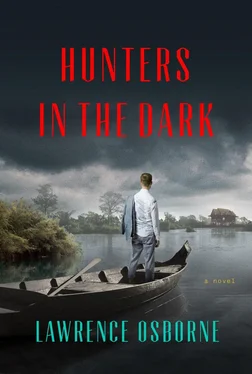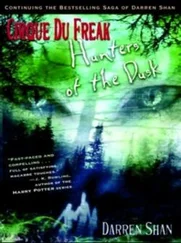It was a choice, according to them, between the Sakura and the Paris. Both had girls. The Sakura was cheaper but the Paris had a nice location on Kampuchea Krom Boulevard and a restaurant on the ground floor. It was a difference of about five dollars. He chose the Paris.
They drove in through the heat of the day. The rain, the driver said, would not come in until the late afternoon that day. The suburbs, meanwhile, lay in a sullen calm and he went over in his mind the dozens of theories he had established as to what had happened. The most likely, to his taste, was that Simon had helped him on his way and would send on his things as soon as he sent word where he was staying. There must have been a reason why he had held on to the backpack, a reason that was not injurious, but, as it happened, no such reason came easily to mind.
On the outskirts of central Phnom Penh the light dimmed and clouds began to mass and they crawled through a river of traffic toward a thing called the Japanese Friendship Bridge. It was two o’clock. He could see already that it was a small, low-lying city with the great river pouring through it. They went past Chinese factories and loading bays, the metal boxes covered with Chinese characters, an office for Bruntys cider, mounds of rose bricks, the shapes of metal silos and the gleam of the pale green-tinted river below. They passed under the bridge, the tarmac shattered as if by mortars. The afternoon hysteria of car horns and the cafés along the streets filling up with anxious men in white shirts. A city with pools of slow life from another age. The trees along the roads then, the echoes of provincial France, a disappeared France of green shutters and dark yellow walls. The long pale gray walls of the French embassy topped with rings of barbed wire and a riverine boulevard swirling with dust and violent wind.
The river curved slowly, dividing the city they were on from a farther shore where half-constructed buildings rose up out of a slightly silver haze. New hotels, towers of dreary metal. They turned inland at a street market of some kind and passed alongside a baked city park, the frangipanis creamy in the sun. The driver glanced at his fare in the vibrating mirror. He looked like a young man about town, a rake down for the weekend. In fact, he looked vaguely familiar. But why did he have no money, so little that he had to stay at the miserable and ill-reputed Paris Hotel? But maybe he wanted a hotel with girls for the weekend. That must be it. But then, where had he seen his face before? Or something about the way he dressed. Most barangs dressed like beggars. This one dressed as if to hide the fact that he was a beggar. If he waited outside the Paris Hotel for a few days he might get another ride out of him. He might need something illegal like a passport.
Robert was not thinking about such things at all. He was watching the rotary swirls of girls on motorbikes, the back riders sidesaddle and helmetless. People massed on the pavements under the shade of mango trees. The great heat slowing down even facial muscles. He was not as dismayed as he had expected to be. The city was, one could see, young and upbeat and fierce, and yet its traffic had a slow, almost choreographed motion to it. They sped leftward into a large boulevard, wide and French — Norodom — and he could see old European villas and mansions set behind walls topped with broken glass and a dark monument at its distant end like a gloomy relic of Angkor. A quiet motor seemed to organize the city. The bikes whizzing in both directions simultaneously never quite collided. The tuk-tuks snaking their way through this chaos never quite came to grief. Almost, but not.
The driver had gotten lost and he circled back up to another boulevard — Monivong — and turned right into it until they came to Kampuchea Krom at a right angle to it. It had a somber, commercial feel. After the second junction, they came to the Paris. The hotel’s name was written over a curved entrance in English, Chinese and Khmer, and around its pale orange columns lounged a handful of cynical-looking drivers. There was a KTV with red Chinese lanterns across the street and a shop with a sign that read Sony, Make Believe.
He had no bags, he was free and light as he came into the colorless and empty lobby with “international” clocks on the wall and the cool glance of two young receptionists.
They barely looked up, in any case.
The lobby had white leather sofas and a coppery bas-relief of Angkor Wat and a soft-drinks fridge with the word Vinamilk. Sashed boudoir curtains made it feel like something other than a hotel.
“Passport,” one of them said impassively.
And suddenly he remembered his passport. Which is to say that he no longer had it.
“It’s at my other hotel,” he said quickly, not missing a beat.
“What hotel?”
“The Sakura. I can get it later.”
The two Khmer girls looked at each other doubtfully.
But it was a barang, a barang was not really a risk, and they didn’t really care either way. Cash is cash.
One of them looked up at the clocks for some reason. The red letters below them spelled out the names of cities they would never see: Sydney, New York and of course Paris. The time in Paris would never be of any use to anyone staying at the Paris.
“All right,” one of them said, “you can bring it later.”
“I will, yes.”
“But then you got to pay up front now.”
“All right — two nights please.”
It was thankfully cheap.
“No bags?”
“I’ll get them later.”
He paid the cash and one of the girls took him up to the fifth floor. As they passed by the lift he saw the photocopies of passport pages of wanted criminals taped to the wall next to it. Heng, Sarquen, Cambodian: eyes like pumice. Men on the run like himself, their images of little interest to guests of the Paris who probably had enough secrets of their own. The girl glanced at him. Her attitude quickly relaxed even though the lift was broken. The futility of the building’s internal heat seemed to make her more amiable. It was the way here, the surface coolness quickly broke down.
“Holiday?”
“Business.”
“Ah,” and her face fell a little.
The Paris was a claustrophobic place, with half-lit corridors, a mama-san on every floor, and girls from the massage parlor sat around doing their day’s makeup and coiffure. They looked up for a moment as he passed and the brushes and eyeliners came to a moment’s standstill. So it was a single man’s place and they kept track of the resident denizens. The room itself was the usual cheap affair in the tropics but there was a working fridge and air-conditioning and a TV with a Japanese channel. The wooden ceiling was so polished that it looked like a floor. No gambling in the HOTEL room on the back of the door.
The receptionist gave him the key and left him there. He locked the door behind him and went to the window and looked down into Kampuchea Krom. Tired and stoic trees withered up in the last hour of sun before the rain hit the city. The traffic went by in a curious silence. Behind a blue grille on a rooftop a woman sat combing out her wet hair. He sat on the bed in a state of vast emptiness and relief and took off the clothes that were not his and looked at the back of the collar and the inside of the linen trousers. Were they not Simon’s clothes, pretty obviously? They did not quite fit and Simon had been wearing the same kind of thing. The labels were of a tailor in Phnom Penh, a place called Vong. They were Simon’s clothes all right, they even smelled of a stranger. The gesture was strange and murky and he could not think it through even now. There was the money, and this was merely a better way of getting rid of him than killing him.
Читать дальше












